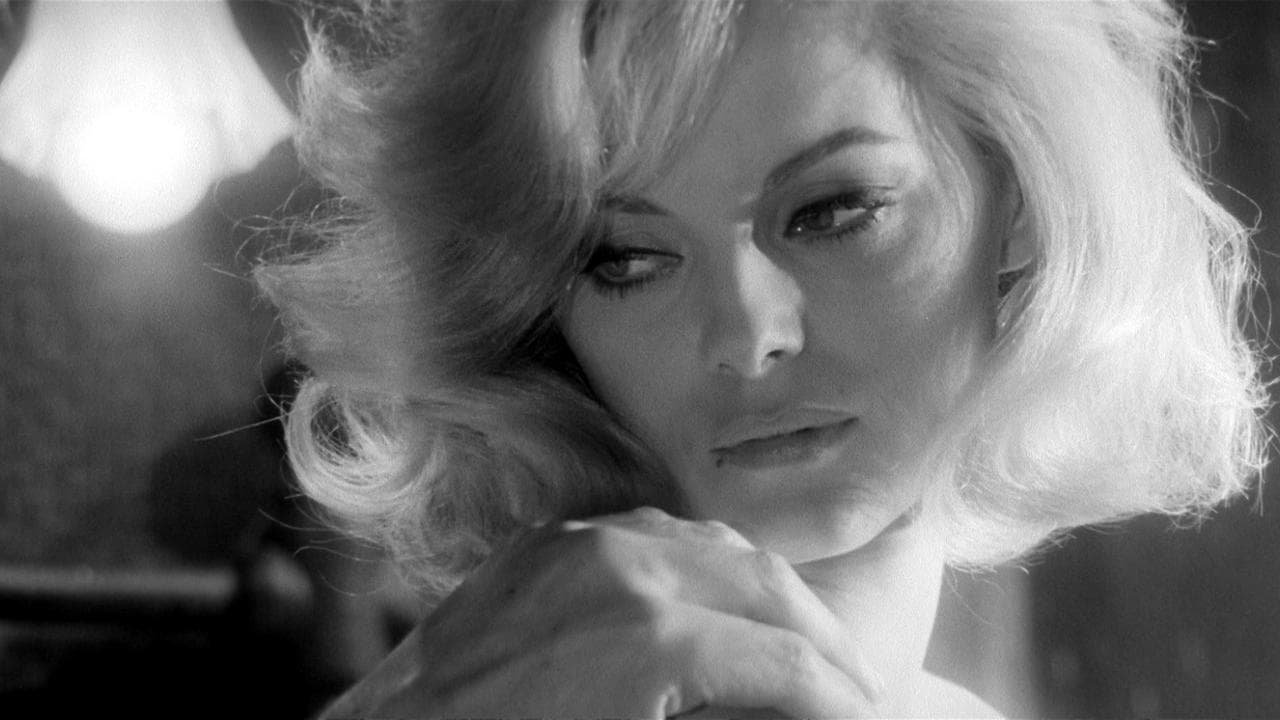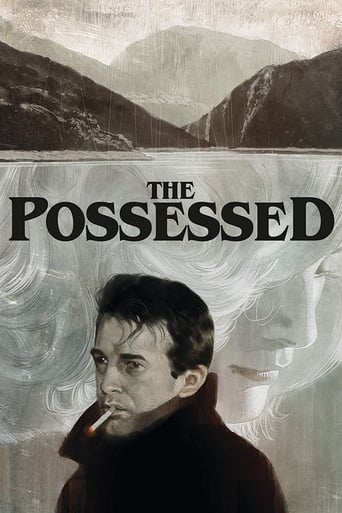

First, let's get this out of the way... there are no zombies! No zombie-like characters. No people under the mysterious influence. It's a simple murder mystery with lots of intentional confusion.Second, let me be pretentious for a minute. The dream scenes were stylish, but overwrought. The plot was thin and padded. Characters went nowhere.OK, so what's so great? Honestly, I don't know what to tell you. The acting wasn't first-rate. The locations were passable. The directing was scattershot. The ending was too pat.But... if you didn't read this review first, you might think you were to see a ghost story. So, from that point of view, it's both tense and a letdown. Tense, because you're waiting for the kick in the gut, a letdown because it's just another mad hatter on the loose.Now, I saw the 82m cut, not the purported 95m, so maybe there were some boffo scenes that I missed. Probably not.Hey, is it "proto-giallo"? I watched "Four Flies on Grey Velvet" right before this, so I'll say "maybe." 1965 isn't exactly "proto."
... View MoreRecently, I had been impressed with Bazzoni's weird offering FOOTPRINTS (1975); so, when I happened upon this even more obscure (and, by all accounts, rarer) earlier title from him, I decided to check it out and, boy, is it a find for Euro-Cult/Art-house buffs! The film, in fact, can perhaps best be described as an arty semi-giallo; interestingly, it contains several echoes to Bazzoni's later effort: the resort town, the central hotel setting, the strange characters encountered by the hero (in FOOTPRINTS, the bewildered protagonist was a woman), the mystery revolving around a missing person not to mention the deliberate (and deliberately-paced) oblique narrative.What is immediately arresting here (in spite of the somewhat fuzzy quality of the print on display) is the supreme style allotted to the film's look which is wintry, bleak and forbidding by its two directors (incidentally, this was Rossellini's only stint in such capacity!); to this end, they wisely recruited veterans such as cinematographer Leonida Barboni (but who also adopts peculiar framing throughout, none more so that the pan in extreme close-up of a character's face with the gleaming lake for backdrop!) and production designer Luigi Scaccianoce. However, equally important to the fabric of the piece are the contributions of Renzo Rossellini (supplying an appropriately moody score) and editor Nino Baragli (whose frequent jump-cuts and seamless juxtaposition between reality, recollection and outright fantasy create a genuine and admirably disorientating effect on the viewer). Incidentally, THE POSSESSED a misleading English title but a literal translation of the original, THE LADY OF THE LAKE, would be no less ambiguous! was co-written (with Bazzoni and Franco Rossellini) by Giulio Questi; for the record, as a director in his own right, the latter went on to make such idiosyncratic yet haunting revisions of genre convention as the Spaghetti Western DJANGO, KILL IF YOU LIVE, SHOOT! (1967) and the giallo DEATH LAID AN EGG (1968).The cast is compact but exceptionally noteworthy: Peter Baldwin (very good in Dino Risi's LOVE IN ROME [1960] here, in what I assume to be his most significant role, he's downright excellent!), Salvo Randone (as the owner of the hotel whom the hero suspects of both lechery and murder, he manages to alternate between a genial and sinister countenance throughout), Valentina Cortese (a typically fine performance, though her weather-beaten looks make it hard to convince us she's Randone's daughter even if a reasonable age gap separates the two actors!), Philippe Leroy (having appeared in so many films from the 1960s and 1970s that I've watched in recent years and, thanks also to his remarkable versatility, the French actor has become a firm favorite of mine!), Virna Lisi (while undeniably sensual, her contribution basically amounts to an extended cameo since her character, who seems to have turned the heads of virtually the entire male cast at some point, is already dead when the film opens and we only see the girl in flashback/fantasy sequences!) and Pia Lindstrom (a rare cinematic appearance by Ingrid Bergman's elder daughter being similarly steeped in mystery, alas, she too is barely given time to create a flesh-and-blood character but, then, her resultant fragile performance emerges to be all the more moving for it!).The plot concerns an author (Baldwin) arriving off-season at a resort town he habitually retired to in order to work, hoping to meet again a servant-girl (Lisi) he's enamored of employed at the hotel run by Randone; however, he's told she's no longer there but notices that her cloak is still hanging in the closet, follows a woman in the streets he sees wearing it (and is eventually disappointed to learn the outfit now belongs to Lisi's replacement). Typically, he decides to delve deeper into the mysterious circumstances surrounding the former maid's demise still, Randone and his family (Cortese assists in the managing of the establishment while brother Leroy owns a butcher shop situated in the courtyard of the hotel itself and, coincidentally, has just returned from his honeymoon with wealthy but naïve and sickly bride Lindstrom) generally evade his probing. Even the only man who's willing to help at first a hunchbacked local photographer (I'm not sure about the actor's name but his face is awfully familiar!), who presents Baldwin with a photo in which Lisi is visibly pregnant suddenly opts out and leaves town in a hurry!; then, there's Lisi's alcoholic bum of a father who seems to have nothing of value for the hero to work on venting the anger and frustration over his daughter's loss by bursting into vitriolic (but ineffectual) nightly rants outside the hotel windows! At one point, Lindstrom makes a weak attempt to communicate with Baldwin but, before they can meet (he had previously noticed the girl walking aimlessly by the lake at night a number of times, but never quite mustered the nerve to confront her), she too is found dead! Eventually, the hero starts to think he may have gotten it all wrong: perhaps Lisi wasn't so much a victim of circumstance (periodically abused by both father and son!) as a femme fatale who got killed simply because she was too greedy.The final revelation then, takes things in another direction altogether; while certainly effectively handled, the scene does perhaps constitute a slight let-down as it won't surprise anyone familiar with Mario Bava's THE GIRL WHO KNEW TOO MUCH (1963), actually the film credited with originating the giallo tradition, in which Cortese also features
... View MoreI saw this on late-night local TV in the early 70s, tolerably dubbed, under the title LOVE, HATE AND DISHONOR, and was immediately taken by it's eerie, VAMPYRE-like style.It never played on TV again, and in the late 70s to 90s I searched for it in vain. I did catch a reference to it under the title Possessed in the Encyclpedia of Horror Movies.Finally found a poor quality English-subtitled VHS a few years back from VideoSearch of Miami and enjoyed it once again. I guess I have to add two more lines of text to meet the minimum requirement to post. I hope this is enough
... View MoreHaving been very impressed by co-director Bazzoni's subsequent "The Fifth Cord", I have been very keen to see "The Lady of the Lake" since I first heard of it four or five years ago when i read Adrian Luther Smith's Excellent "Bloody and Black Lace" - a definitive collection of giallo reviews. It appears, under the title "The Possessed" in the obscure and rare titles section, along with a superlative review. Subsequent attempts to track the title down were in vain, until I popped into El Corte Ingles on my most recent Spanish holiday and found it on Filmax's "Giallo" collection under the title "El Mujer Del Lago". This is the only DVD outing I've ever heard of and there were both pros (a fantastic anamorphic print) and cons (it's Spanish and Italian only, with Spanish subs) - the cons apply as I'm an English speaker, but I was able to manage enough Spanish (with my dictionary at hand) to navigate through this beautiful, atmospheric film in Spanish with subs showing.It's as good as it's advance word suggests - an ice cool, incredibly shot mood piece which emerges as a giallo only in hindsight, as at the time it was filmed, the concept hadn't been formed and we were still four years away from the giallo cycle proper which was initiated by the box office success of Argento's "The Bird with the Crystal Plummage" and Martino's "The Case of the Scorpion's Tail" amongst others. The plot: A writer returns to the small town where he had vacationed previously. he's keen to meet up with his former maid, Tilde, with whom he had enjoyed a romance previously. However, she isn't there and the locals are not keen on talking about why. As he goes through the town, casual encounters build up an atmosphere of menace as everyone seems to be brushing her untimely death under the carpet. The writer presses on in his investigations, seeking the facts behind her death and finding an awful lot of problems lying beneath the town's impassive surface, but in doing so unleashes the pitch black heart of darkness that lies within this film's conclusion. In terms of style, this is far away from the post-Argento iconography of the giallo. There are no black leather gloved killers here, no stalk and slash killings. All of the (physical) violence occurs off camera. But this remains one of the most claustrophobic, oppressive films of it's time. Much of the drama unfolds within the walls of the hotel, with flashbacks, fantasies and the present unfolding in this space. The film it feels most like is Renais' "Last year At marienbad", but with a more defined narrative. I suspect a lot of the time shifts come from co-screenwriter Gulio Questi, who would later return to the editing styles shown here in his own films such as "Django Kill... If you live, shoot!". Bazzoni contributes his unnerving eye for architecture as counterpoint and subtext to the story (he's on a par with Michael Mann in this respect).This is a film about love, all types of love, from the casual to the obsessive, and the film gradually cranks up the tension until the conclusion. I hope that a wider audience will be able to embrance this with a DVD release from an outfit such as No Shame or Blue Underground. In the meantime, I'd advise anyone who cares about atmospheric horror/ thriller cinema to pick up the Spanish release, which can be had for a remarkable price (I paid 8.95).
... View More